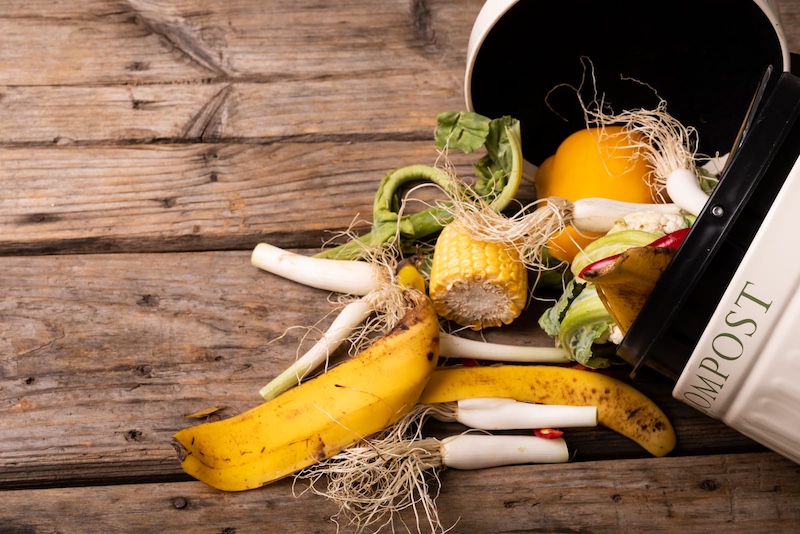Ah, composting – it’s like the magic trick for your food scraps. You throw in some old banana peels, coffee grounds, and yard waste, and poof! You’ve got nutrient-rich soil for your garden. It’s a beautiful cycle of life, right? But when it comes to cooked food, some composters hit a wall. “Why can’t I toss my leftover spaghetti or last night’s pizza crust in there?” you ask, scratching your head. Well, let’s get into it and clear things up – don’t worry, I’ve got you covered!
It’s a Smelly Situation
Let’s face it, cooked food is a bit like that party guest who shows up after everyone else is gone and just won’t leave. When you compost cooked food, especially those delicious scraps from your dinner, you create a stinky mess.
As the food breaks down, it releases gases, and unlike raw scraps that decompose in a more balanced way, cooked food tends to rot quickly. And we all know where that leads – unpleasant smells that can attract pests, like rats, raccoons, and even flies. Not exactly the kind of company you want hanging around your compost pile!
Attracting Pests: No Thanks!
Speaking of pests, composting cooked food can be like setting up an all-you-can-eat buffet for critters. Cooking changes the texture and scent of food, making it much more appealing to animals.
Meat, dairy, and oils – basically all the stuff we love to cook with – become irresistible to rodents, raccoons, and other pests who are on the lookout for an easy meal. They’re sneaky and persistent, and the last thing you want is for your compost bin to turn into a wildlife hangout spot.
The Nitrogen and Carbon Imbalance
Now, let’s get into the science of it! Composting is all about balance. You’ve got your nitrogen-rich “greens” (like fruit scraps, coffee grounds, and grass clippings) and carbon-rich “browns” (think dry leaves, straw, and cardboard). When you compost raw food, it fits right into this balanced equation. But cooked food is a whole different story. It can mess with this delicate balance, leading to either too much nitrogen or too little, both of which can hinder the composting process.
When cooked food is added to your compost pile, it doesn’t break down in the same way as raw food. It often releases too much moisture and too many nutrients, which can throw off the compost’s carbon-to-nitrogen ratio. The result? A pile that takes much longer to decompose – and might not give you the rich, healthy compost you’re hoping for. It’s like making a smoothie but forgetting the fruit. Not ideal.
Fatty Foods? Just Say No!
Now, let’s talk about that delicious leftover slice of pizza with extra cheese. While your stomach might thank you for the indulgence, your compost pile definitely won’t. Fats, oils, and dairy are the composting equivalent of that one friend who keeps talking loudly over everyone else at the party – they just don’t mix well. These fatty foods coat the other organic matter in your compost, making it harder for microbes to break down the material. As a result, things get a bit… well, stuck.
The Heat Factor
Composting works best when it’s happening at a nice, toasty temperature – think of it as a warm, cozy spa for your food scraps. But cooked food, especially things like rice or pasta, retain heat long after they’ve been served. That heat can mess with the internal temperature of your compost pile. If the pile gets too hot (which is easy to do when you toss in food that’s still a bit warm), it can actually kill off the beneficial microbes that help break down your compost. It’s like sending your compost crew on vacation – and we don’t want that!
So, What’s a Cooked-Food Lover to Do?
Don’t worry, you don’t have to throw out those tasty leftovers! Instead, try these alternatives:
- Feed Your Compost with Raw Scraps: Stick to the tried-and-true raw veggies, fruit peels, and plant-based scraps for your compost.
- Create a Separate Bin for Cooked Food: If you’re really itching to compost cooked scraps, consider setting up a separate pile or bin dedicated to cooked food, which can break down differently.
- Waste Not, Want Not: Look into local composting programs or composting services that accept cooked food – they often have the right systems to handle the mess.
At the end of the day, cooked food just doesn’t fit well into the composting world, and that’s okay! Stick with the raw stuff, and you’ll keep your composting game strong and smell-free. Happy composting, friends!
